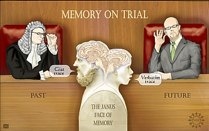This is actually an NSF news item that came out a couple of months ago. I’m not sure if it hit the main press, but as a parent and educator, I find it fascinating. Here’s the gist of the research by Valerie Reyna and Chuck Brainerd (both from Cornell University):
[C]hildren depend more heavily on a part of the mind that records, “what actually happened,” while adults depend more on another part of the mind that records, “the meaning of what happened.” As a result, they say, adults are more susceptible to false memories, which can be extremely problematic in court cases.
 Interestingly, courts often will discredit the memories of children (in favor of those of adults). As a parent, I fall prey to the same misconception as I often assume my child will create “stories” that have little resemblance to the real world when ask to recall an event.
Interestingly, courts often will discredit the memories of children (in favor of those of adults). As a parent, I fall prey to the same misconception as I often assume my child will create “stories” that have little resemblance to the real world when ask to recall an event.
The researcher’s theory differentiates Verbatim memory from Gist memory:
Verbatim traces are memories of what actually happened. Gist traces are based on a person’s understanding of what happened, or what the event meant to him or her. Gist traces stimulate false memories because they store impressions of what an event meant, which can be inconsistent with what actually happened.
“Understanding” is dependent on development and therefore will be less of an influence in children. The key is an accurate recall technique that can separate any fear the child may have of recall to adults (I often feel like I’m pulling teeth to get my daughter to recall events after she gets in trouble… did she really forget or is it because I’m her dad??).
I have a theory on how this relates to education… the US lags behind Asia in rote performance measures (math, memorization), yet we are looked up to for our creativity and innovation. Verbatim vs. Gist. ‘Which is better’ is hotly debated, but I would say that my personal experience (being able to peer into the asian culture) would show that Asian families but greater emphasis on Verbatim (this is how it is) while American families focus on Gist (I want you to understand). I would contend the education systems follow suit.
So what does this mean for teaching and learning? I am open to suggestions.